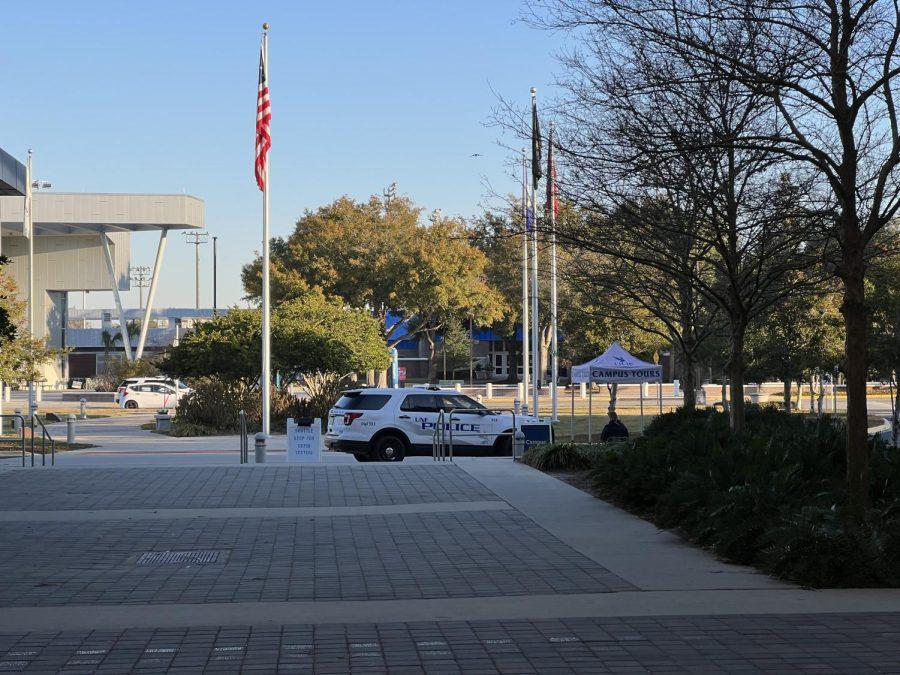Getting pulled over while driving is enough to ruin anyone’s day, but a newly enforceable Florida statute adds another violation for drivers to be aware of– loud music.
State Statute 316.3056 prohibits drivers of motor vehicles from playing music that is “plainly audible at a distance of 25 feet or more” or “louder than necessary for the convenient hearing by persons inside the vehicle in areas adjoining churches, schools, or hospitals” according to the official site of Florida Legislature.
The Jacksonville Sheriff’s Office announced this new statute will begin to be enforced starting July 1, but it actually isn’t as new as Floridians might think.
“It’s [FL Statute 316.3045] really not new. It’s a variation of a different statute. There was a statute passed a few years back that prohibited loud music from cars, the difference being there was that you had to have a decibel meter in order to properly cite somebody,” University of North Florida Police Department Chief Frank Mackesy said.

He explained that without a decibel meter, the statue wasn’t very enforceable. Chief Mackesy inferred that this new version of that law probably serves to expand those requirements by including music that can be heard audibly from 25 feet away or more, not just based on decibels.
Tim Groulx, a UNF Music Education professor, also explained how this law might look in action.
“Cars that are sold by the manufacturer with an unmodified sound system, most of those are regulated at about 100 decibels. The threshold of human hearing ranges from about 20 decibels to 120 decibels, and anything below 20 is imperceptible and 120 is generally described as the threshold of pain,” Groulx said.
Groulx conducted his own experiment to test what audio level would be heard from inside a vehicle at 25 feet away. He used a decibel meter that read between 95 and 100 decibels when the stereo was turned all the way up.
After rolling the windows down and walking about 25 feet away, the meter read 60 decibels. He explained that 60 decibels is an audio level one would experience in a face to face conversation.
“It [the law] is focusing on people cranking up their stereos, and even more so for people with modified sound systems that can reach beyond the threshold of pain, and that is a disturbance,” Groulx explained.
The statute also states that “The Department of Highway Safety and Motor Vehicles shall promulgate rules defining ‘plainly audible’ and establish standards regarding how sound should be measured by law enforcement personnel who enforce the provisions of this section.”
Professor Groulx explained that the vagueness of this law makes it very subjective because it is left up to The Department of Highway Safety and Motor Vehicles to interpret the context of the law, which he believes leaves a lot of room for discretion.
As far as effectiveness goes, professor Groulx doesn’t expect many people to turn down their volume, especially when many may have spent thousands of dollars on their stereo system.
“We can’t criminalize being a 16- to 25-year-old male,” he said.
Locally, UPD Chief Mackesy doesn’t see this law necessarily impacting the UNF campus or students.
“It’s not a very prevalent crime. I don’t know that we’ve ever had a complaint about that on campus. The big thing on our campus is speeding and cell phone usage while driving. Other than that we don’t have many problems,” he said.
One of the backbones of this law’s reasoning is safety; too loud of music can inhibit one’s ability to hear emergency vehicles or police cars, which can result in a dangerous situation. While the odds of getting a ticket for simply turning your stereo up may be slim, it might be something to consider the next time you go for a car ride and want to jam out to your favorite song.
___
For more information or news tips, or if you see an error in this story or have any compliments or concerns, contact editor@unfspinnaker.com.
















